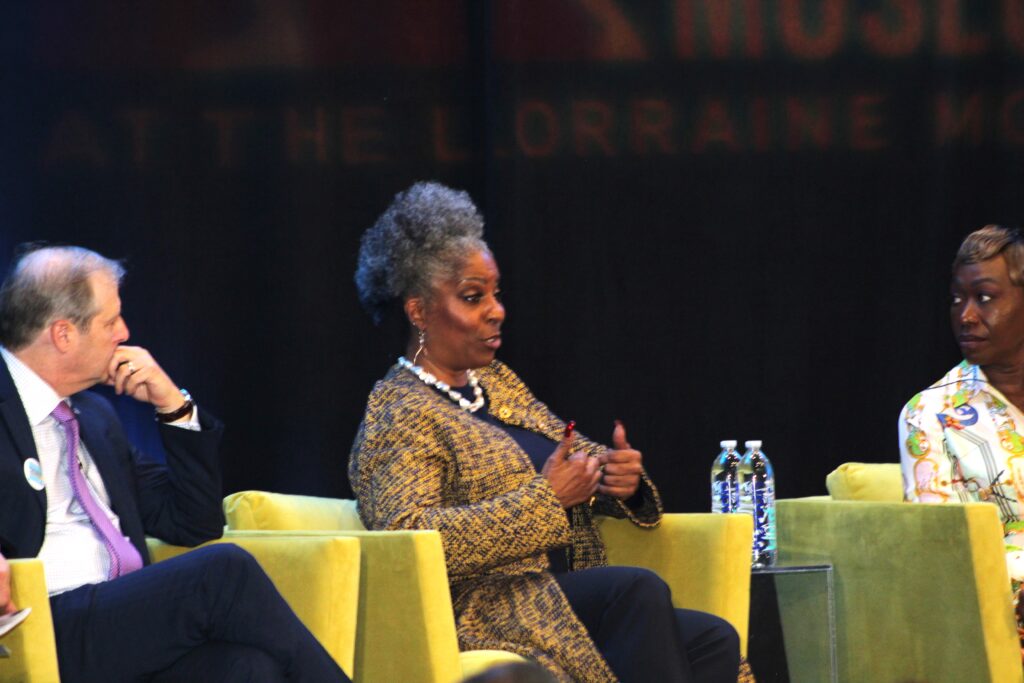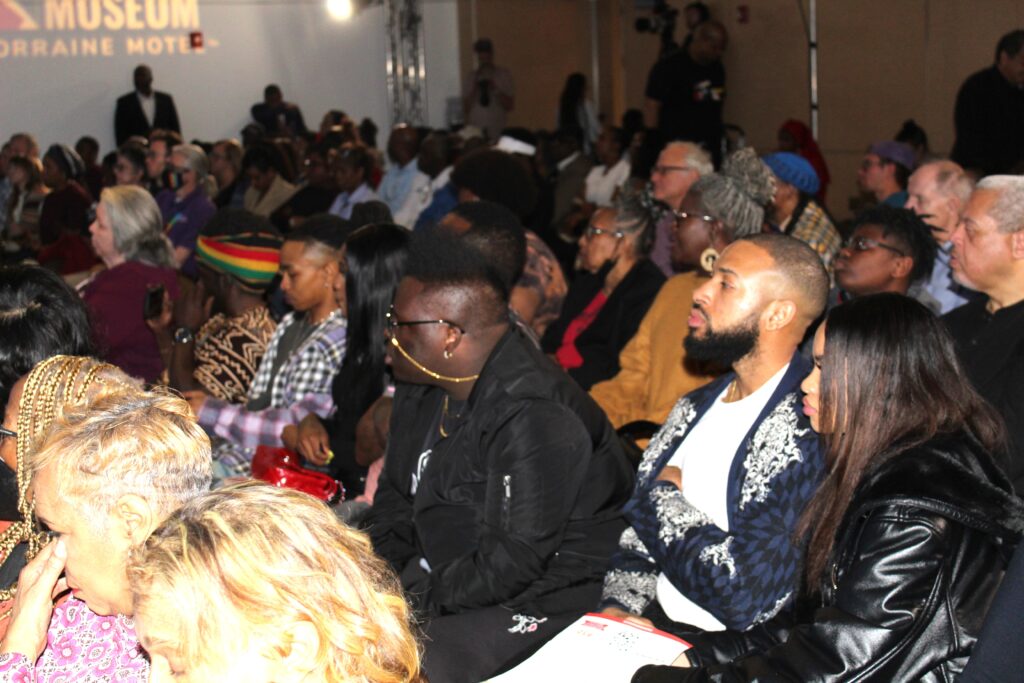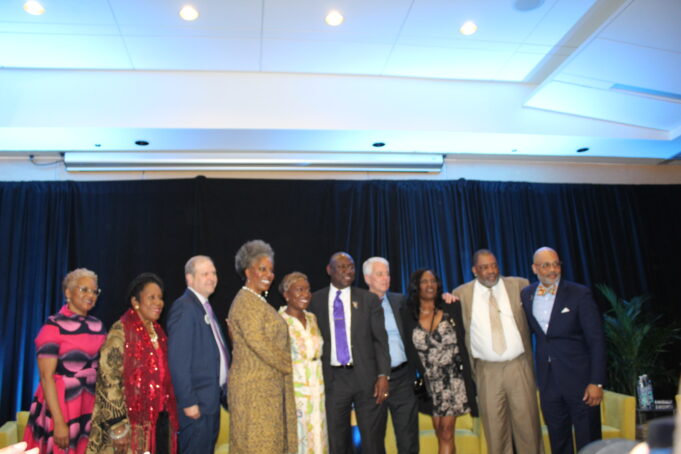by Zakiyyah Muhammad
@zakiyyahmaryam_
MEMPHIS—The fight for justice for Tyre Nichols has not slowed down in the city of Memphis. Since the young, Black man’s death, the outcry against violent police misconduct and lack of accountability has been the theme in the disappointed community.
On the evening of March 30 the National Civil Rights Museum began a four-part series of panel discussions on the controversy of police brutality entitled, “The Reckoning: Community Policing and Accountability.” Tyre’s parents Rodney and RowVaughn Wells, Attorney Benjamin Crump, Rep. Sheila Jackson Lee (D-Texas), author and professor Alex S. Vitale, retired LAPD Sergeant Cheryl Dorsey and MSNBC host Joy Reid wrestled with varying nuances towards finding solutions to hold police more accountable for misconduct.
Mr. Wells told The Final Call that it’s time to “put words into actions.” He shared during the panel discussion that police officers should be held more accountable for their mishandling of citizens while in uniform.
“There’s too much of this senseless violence going on in America. It’s too many parents going through what we’re going through and it’s horrible. We need more accountability for these cops, we need more accountability for the cops watching the cops do what they did. This is a disgrace. And when we found out that all five officers were Black, that made it more of a disgrace, especially in Memphis,” he said.

Ms.Wells is still heartbroken at the tragic loss of her son. She continues to defend the character of her son, noting that he was a “good boy” and had “no trouble” and “no (criminal) record.” Ms. Wells says she’s still trying to piece together how this all happened and feeling extremely disappointed after officers intentionally lied to her about what happened to her son.
“If that sky camera was not there we would not have known anything because when they came to our door, we didn’t know my son was 800 feet away,” she cried.
Ms.Wells said the officers told her that her son was “nearby.” “Nearby? What does that mean? They said my son was being attended to by the paramedics because he was tased and pepper sprayed. They did not say my son was leaning against the car dead already because I don’t care what anyone says, my son died January 7 and not January 10. That’s when the doctors pronounced him. My son was already dead when I walked into the hospital.,” Ms. Wells stated to to the audience.
Alex S. Vitale is a sociology professor and coordinator of the Policing and Social Justice Project at Brooklyn College and CUNY graduate center and was one of the experts on the panel. He shared that political systems should be held accountable for their involvement with law enforcement and the justice system. “We’ve been given a false choice.

We got a problem and we are told we need to have policing or we can have nothing,” he said. Professor Vitale strategically rebutted this notion by bringing up the example of Newark Mayor Ras Baraka’s Office of Violence Prevention Program which acts as an alternative form of policing. As a result of this program, Newark has one of the lowest homicide rates, said Prof. Vitale. “He took money out of the police budget and created an Office of Violence Prevention and Trauma Recovery because we know so much of this violence is about a cycle of violence,” he explained.
Cheryl Dorsey, a retired LAPD Sergeant, author and human rights advocate, stated that ending qualified immunity will hold officers accountable. Qualified immunity is a type of legal immunity that grants governmental officials, including law enforcement, immunity from civil lawsuits or individual liability in a case unless a “clearly established constitutional right” was violated. In a post-panel interview with The Final Call, Ms. Dorsey explained that ending qualified immunity would make “individual officers to be held financially responsible” and “will go a long way to deterring errant police officers from engaging in misconduct.”
She also noted that there’s opposition in the U.S. Congress to gain consensus on ending qualified immunity. “The Republicans are very much against it because they understand the ramification. They understand that officers will no longer be sheltered and coddled by police agencies; that they would have to own some of their misdeeds. And so that is the reason why police unions and ultimately Congress supports not ending qualified immunity,” she said.
Recently, four of the five Black Memphis Police officers charged for the murder of Tyre Nichols face decertification and are prohibited from doing police work.
Attorney Crump shared that “policing started out as slave patrol” and not much has changed since slavery in how Black people are treated in America. Atty. Crump shared he and his colleague Kareem Ali have received many calls that there are thousands more Black and Brown people suffering at the hands of police officers abusing authority.
“Some people are elected on making sure that there is some hyped up crime statistic to say ‘aye, we gotta be tough on crime so appoint me so I can put Black and Brown people in place,” Atty. Crump explained.
Rep. Sheila Jackson Lee shared that Americans are “dealing with an impossible set of circumstances” when it comes to participating in the political process and seeing the results they intended when electing officials into office. She added that “there is a block against any uplifting and life-saving approach.”
The March 30 panel is the first of a series of national convenings centering on issues that are based on justice, equality, economics and accountability. This will culminate in a national symposium called “The Resilience” set for February 2024.
After the “The Reckoning” panel, community members and advocates shared their perspectives about the panel and their vision for community policing and accountability. Wanda Halbert, Shelby County Clerk and former legislator on the Memphis Shelby County School board, shared her many insights and experiences in combating the social ills in the city of Memphis at the political level. She reflected on one of her battles with the system was advocating for a former football player, Jacquez Crawford, who was falsely accused of rape.
“He was incarcerated for more than 30 days in the juvenile court system. And seeing that on television, I sprung into action. But it’s a shame that our Black boys and men don’t feel safe at home,” she said.
When it comes to pushing for better political reforms that are in the best interest of Black Memphians, Ms. Halbert sid that her saddest obstacle is “the pushback by other Black officials.”
John Muhammad, general manager of 88.5 FM C 19 TV, “The Voice MSCS shared his reflections about the panel and what it means to him personally.
“Every day when I’m on the airwaves, I’m trying to push encouragement, upliftment quality information,” Mr. Muhammad told The Final Call. “If I’m doing my part to do what the Honorable Minister Louis Farrakhan said (making our communities a decent and safe place to live), it’s going to take everybody to do something in the area that they are in,” he said, referring to the Nation of Islam Minister and world leader.













